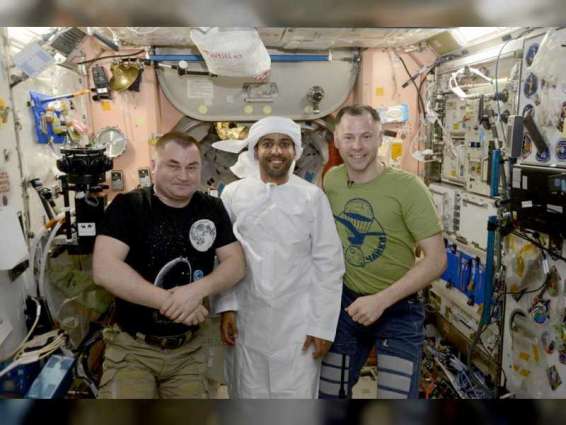DUBAI, (Pakistan Point News - 01st Oct, 2019) On his sixth day aboard the International Space Station,ISS, Hazza Al Mansoori, the first Emirati astronaut, conducted an experiment to study the mechanisms of action and efficiency of different countermeasures against disturbances in the astronaut’s motor activity under space flight conditions.
Al Mansoori also conducted an experiment to study bone status indexes, body composition, and endocrine regulation in cosmonauts before and after a short-term space flight.
Al Mansoori began day 6 aboard the ISS by communicating with the ground station at the Mohammed bin Rashid Space Centre in Dubai, and informing them of his daily schedule. He then spoke to MBRSC again at the end of the day. A video conference also took place between Al Mansoori, school students, and media professionals, where the audience had the opportunity to ask questions that were answered by Al Mansoori. This event was attended by Shamma bint Suhail Faris Al Mazrui, Minister of State for Youth Affairs, who asked him to say a few words to youth who dream of exploring space.
In a message to young people who dream of exploring space, Al Mansoori said, "Anyone in the UAE is lucky, and Emiratis are lucky, because we have leaders who have given us all the tools for success. To the youth of the UAE and the Arab region, I say, hope exists, and we at the United Arab Emirates have opportunities in all fields, but we must work with dedication and depend on Allah, while having a strong willpower. This is what we learn from our leaders; that there is no impossible, and that you will achieve your goals if you work hard enough. I thank Allah for my country, the United Arab Emirates".
The students asked Al Mansoori if there is internet on board the station. They also asked him about his favourite scientific experiment, the distance from Earth to the ISS, if they switch off the lights at the ISS when they sleep, the adopted time at the ISS, if he wants to return to the ISS after completing his mission, and the first thing he will do upon his return to Earth.
Al Mansoori highlighted that his favourite experiment was using Virtual Reality in studying time perception.
He explained that the ISS is about 400 kilometers from Earth, and said that he wants to return to the station a second, third and fourth time. He also thanked the UAE’s wise leadership for giving him this opportunity.
"Most of the lights inside the station are switched off when we are asleep, to save energy, and the adopted time at the ISS is Greenwich Mean Time. Our day starts at 6:00 am, and ends at 9:30 pm," added Al Mansoori.
Al Mansoori also said that there is Internet on board the station that they use while communicating with the ground station for communication and sending e-mails.
He confirmed that the first thing he will do when he returns to Earth is to speak to his mother and tell her that he has returned safely.
The astronaut recorded his diary for 15 minutes to document life aboard the ISS and his activities aboard.
Al Mansoori also spoke to Dr. Hanan Al Suwaidi, the flight surgeon for the mission, who followed his medical status throughout his time in space.
Al Mansoori conducted 16 scientific experiments in cooperation with international space agencies, including the European Space Agency, the Japan Aerospace Exploration Agency, and the Russian Space Agency Roscosmos. Six of these experiments will be conducted in microgravity, and the results of the two environments will later be compared. The experiments include studying the reaction of vital indicators of the human body aboard the ISS, as well as other physical, biological and chemical experiments. Al Mansoori was the first astronaut from the Arab region to participate in such research.
He also conducted some of "Science in Space" experiments, which is organised by MBRSC in participation with schools from the UAE. In the first phase, the experiments were done on Earth before the mission in the presence of the Emirati astronauts Hazza Al Mansoori and Sultan Al Neyadi.




